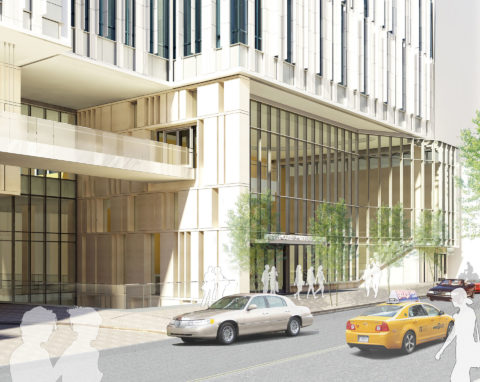
City University of New York Hunter College Science and Health Professions Building
The 336,000-square-foot CUNY Hunter College Science and Health Professions building creates consolidated, efficient, and state-of-the-art science and nursing facilities, which will benefit its faculty, researchers, and students from close proximity to its main campus on the Upper East Side as well as from the neighborhood’s world-renowned medical and research institutions.
The proposed building will allow Hunter to consolidate its related Science and Health Professions programs under one roof in a state-of-the-art art vertical campus for academic research in the biosciences and health profession training. The facility will provide professors and students with the modern classrooms, laboratories, and cutting-edge equipment they need to continue pushing the frontiers of teaching and scientific research. As well, the facility will allow Hunter scientists and health professionals to maintain close ties with Hunter’s main campus on the Upper East Side as well as with the neighborhood’s world-renowned medical and research institutions.
The lower floors contain specialized training and simulation labs for the health professions, teaching laboratories for the life sciences, general classrooms, faculty office, academic lounges, and a high-tech learning center and library. The upper floors are dedicated to graduate research laboratories for the departments of biology, chemistry, physics and psychology, associated faculty offices and a vivarium. A full building atrium connects all the floors to create an awareness of the unity of the sciences that make up Hunter College’s curriculum.
The façade is an assemblage of ‘modules’ based on the structural grid and consisting of terra cotta panels and glass infill. The relationship between opaque (terra cotta) and transparent (glass) wall is controlled by the pattern of modules applied to the facade. Vertical terra cotta fins of varying depths provide shading, reduce solar heat gain and control glare, while providing an interior environment with an abundance of natural light and expansive views of the East River beyond.
详情
- 年份
- 2013
- 项目地点
- New York, NY
- 项目规模
- 336,000 GSF
- 功能
- Training & simulation labs, graduate research labs (chemistry, biology, physics, psychology), vivarium, teaching labs, classrooms, faculty offices, lounges, atria, terrace, learning center & library
团队
- Ennead 团队
- Todd Schliemann, Don Weinreich, Joseph Fleischer, Alex O'Briant, Zach Olczak, Melissa Sarko, Brent Stringfellow, Margaret Tyrpa, Kathleen Kulpa, Aaron Cattani, Do Young Cho, DuHo Choi, Alfonso Gorini, Brad Groff, Kyo-Young Jin, Edgar Jimenez, Wanlika Kaewkamchand, Stephen Kim, Nick Kratz, Ty Larson, James Macho, Graeme Reed, Harry Ross, Yong Kyun Roh, Joanna Williams, Hsin Yi Wu
- Collaborating Architect
- Perkins Eastman













